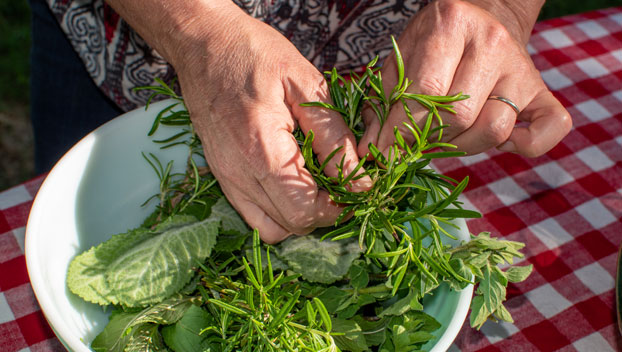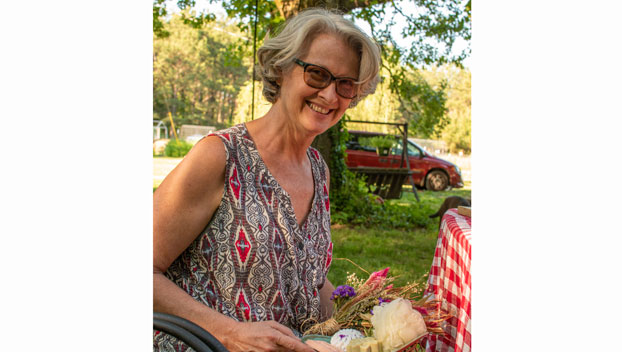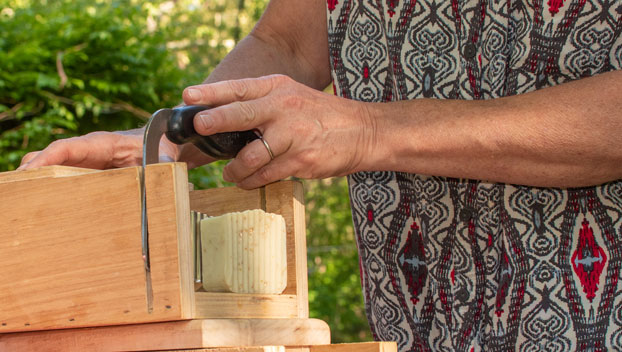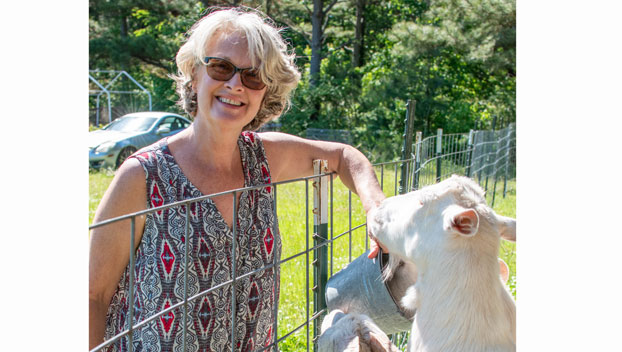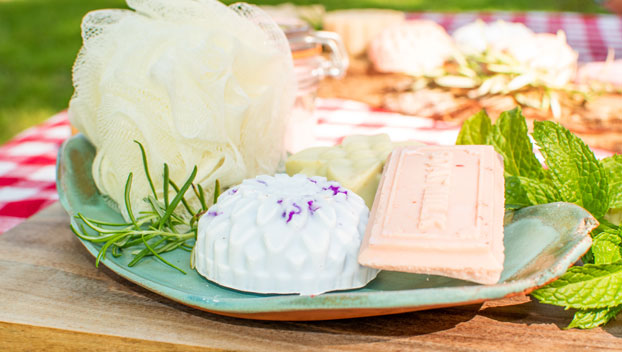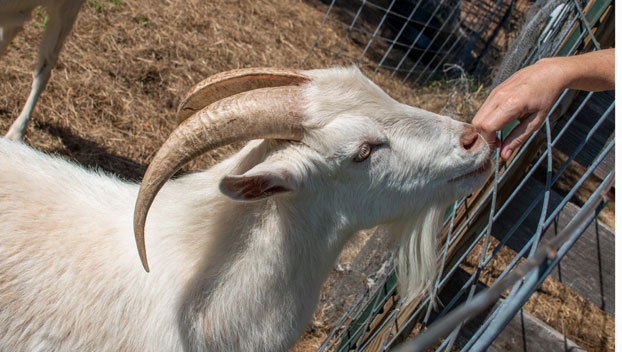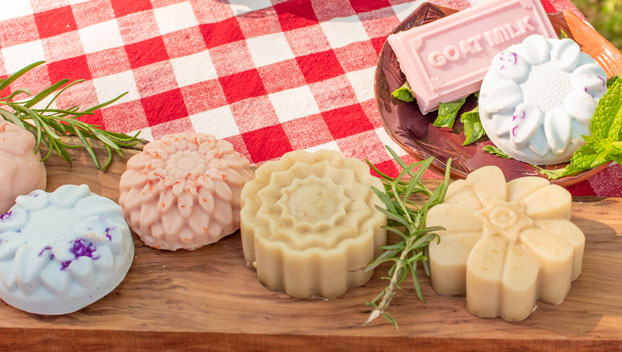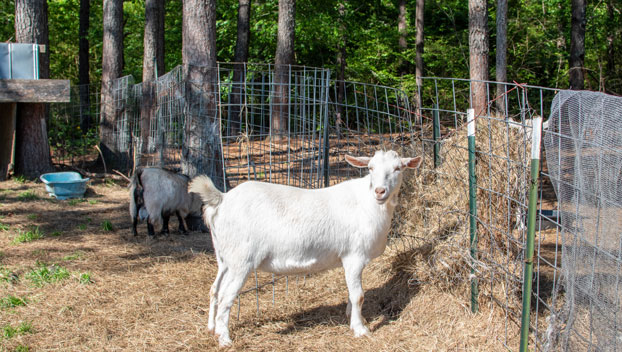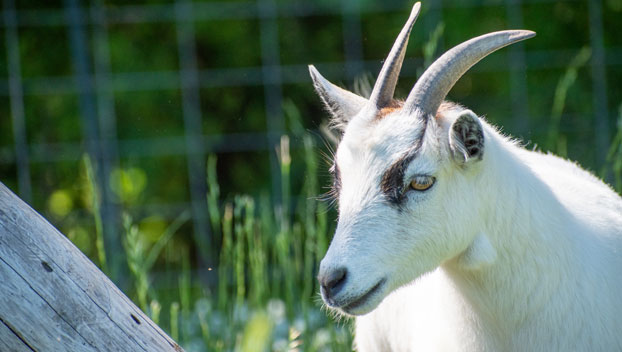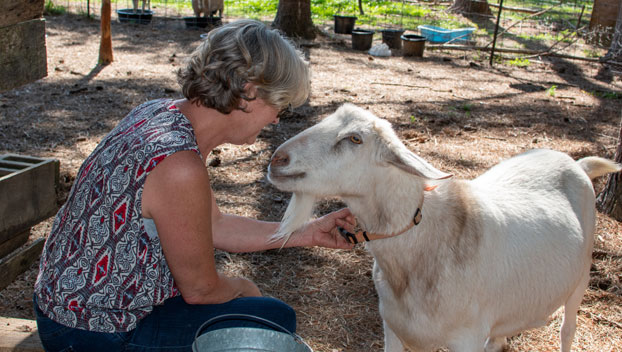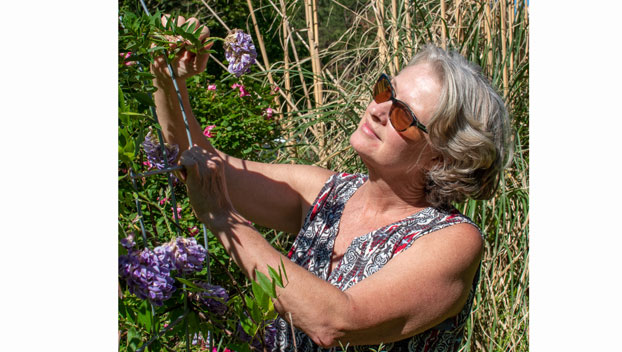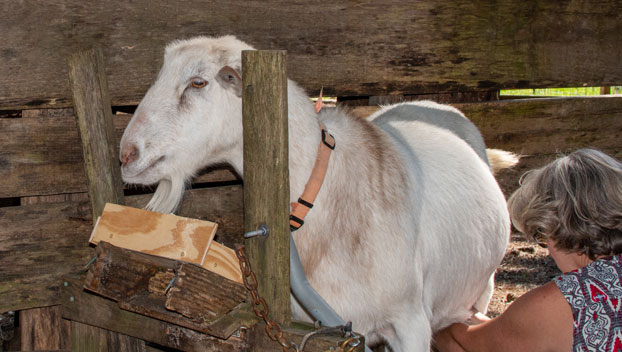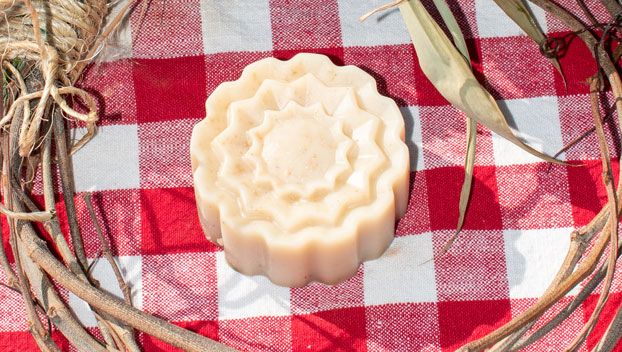Creative clean—Goat milk forms basis for handcrafted bath products
FRANKLIN LIVING— On Rusty Armadillo Farm in Hodges, Tracy McCauley and her husband Doug grow a lot of their own fruits and a wide variety of vegetables and herbs, and they raise hens and goats – the latter of which provides McCauley with a special opportunity to tap into her creativity. Using goat milk, McCauley makes, uses and sells soap, lotion, bath salts, sugar scrubs, body butter and shaving soap.
She said she started making goat milk soap about seven or eight years ago in answer to having sensitive skin that reacts to artificial fragrances and is easily affected by poison ivy. She learned a lot by watching free videos on YouTube and checking other online sources.
Once she had the basics down, she started experimenting to tweak her products. “I’m not afraid of failure,” McCauley said. “I’ll try most things at least once. If I keep with it, when I have the process down, I enjoy trying different things to adjust for my preferences.”
McCauley said goat milk soaps are harder than the average bath soap but have a nice lather – more of a creamy lather than a foamy one. She estimates a bar of goat milk soap lasts three or four times longer than a bar of soap bought in a store.
It’s important to her to have control of all the ingredients, McCauley explained. She started making soaps and other products for personal use and then expanded to creating gifts for friends and family and eventually to selling at community festivals and through Facebook.
McCauley says there are special considerations for making soap that includes lye – which helps with the irritation caused by poison ivy – as an ingredient. Fresh lye is caustic and could burn skin if touched too soon. Additionally, McCauley said she has to measure everything “pretty meticulously.” Adding too much lye can make the soap too hard and brittle; failing to add enough lye to the soap will make it too soft; and if the lye is added to the goat milk too fast, it will spoil the milk and turn the color. “It’s easy to ruin a batch,” McCauley said.
That’s why she needs to plan about a month ahead: three or four days to make the product and then two or three weeks to let it set before wrapping and sending it.
Tallow is another key ingredient in the soap. “When it reaches the right temperature, around 98-100 degrees Fahrenheit, that’s when you mix it in. The mixture then starts to thicken up really quickly,” she explained It’s at this point, McCauley said, that “organics” can be added, such as oatmeal, organic teas, herbs, peppermint or oregano oil or rosemary and essential oils. She uses both silicone and heavy wood molds to shape the soaps.
McCauley said sweet pea and lavender are popular scents, and cedarwood is her personal favorite. She also makes lemongrass, peppermint and citronella scents, among others. “On our farm, we try to avoid harmful chemicals and fragrances,” McCauley said. “I purchase matte clay for the pigment and make and buy essential oils. I know what I’m making is healthy, and I can feel good about what I’m using and selling.”
The essential oils McCauley makes are created by using a “whole lot of fresh herbs and adding a warm carrier oil.” She said she often uses grapeseed oil because it doesn’t alter the scent of the product.
McCauley said she finds working with her goats to be therapeutic. She said they bring her peace and there’s no “pretense or pressure” when working with animals – it “just feels real and joyful.”
The McCauleys enjoy using the products she makes with the goat milk, as well as drinking the goat milk, but they also have a lot of fun watching the baby goats grow and play and seeing the goats interacting with one another and with them.
Originally from Ohio, McCauley grew up on a farm. Later, she and her husband had a small farm where they raised ostriches. She spent 30 years as a hairdresser, a number of them in her own salon in Ohio, as well as in a day spa near Key West, Fla. These days, she is happily spending her time working on a variety of pursuits. “I stay inspired by having multiple creative outlets. I enjoy keeping busy, and I love a challenge. I’m always working on a project or thinking about one.”
It wasn’t until after moving to Alabama that she started raising goats. McCauley’s neighbor called one day because she knew she had grown up on a farm and thought McCauley might be able to help with problems one of her goats was having while giving birth.
Two of the babies were lost, but the third survived. McCauley said she remembers going home that day and telling her husband they needed to start keeping goats. “When we were delivering the baby goat, I kept telling the lady’s granddaughter you just gotta have faith, and that’s what we wound up naming the baby I helped deliver. Four months later, we got her – along with two other goats about the same age – and they became the first on our farm,” she said. “Goats are very social. They can even die of loneliness, so you wouldn’t want to have just one.”
At the moment, McCauley has 11 goats of three different breeds. The Nigerian Dwarf goats have straighter, sharper horns, while the Pygmies have curved horns that get longer and curlier the older they get. The Saanen goats are bigger – “standard size.” Some of her goats are half Saanen and half Pygmy. One of the goats is half fainting goat.
McCauley said she recommends not keeping too many goats together because they have a pecking order, as many animals do. They can “bang horns just to show who’s the boss.”
“All of my goats have been together for a while,” she added. “You can add more goats to a herd. After two or three days, they calm down, though they may be a little rowdy at first, being skeptical of strangers, as are many animals.”
When milking, McCauley said she doesn’t take all the milk. Instead, she shares it with the baby goats. Some people take 100 percent of the milk after a couple of months or even just a couple of weeks.
She milks once a day for about six months or so until the mother goat starts to wean the baby. She said you could theoretically continue milking a goat, as they keep producing as long as you keep taking the milk, but she’s unsure what the health implications might be for the goat, and that’s not an option she has ever pursued.
“Doug and I really want to be as self-sufficient as possible. We like to grow what we can for ourselves. I’d rather not buy it at the store if I’m able to grow it at home,” McCauley said. “A lot of the reason for this is to help ensure we have healthier food, but the taste can also be better. I know our berries were grown in an organic way, and I can just go eat them off the vine and not worry. Although there are a lot of factors and steps in the process of growing our own food and making my own personal care products, I enjoy it.
“When I make items like the soaps, I like to do it on a day when I can have the house to myself and the dogs are outside. It smells wonderful in the kitchen when I’m preparing the soap. It’s an enjoyable process.”
Among her other creative endeavors are painting, gardening, writing and pyrography. She wrote a children’s book, “Frog Prints,” that she and her daughter, Ashley Todd, illustrated together.
McCauley also makes her own bug spray using a witch hazel base and will soon start making and selling soy wax candles. “Soy burns smoother and longer than beeswax, and it retains the scent better,” she said. “My candles will have wood wicks that crackle as they burn.” Some of the scents she plans to offer include rose, vanilla, mint, sweet pea, grapefruit, amber, cedarwood and bergamot.
McCauley can be contacted via Facebook, by cellphone at 305-395-1234 or by email at tracymccauley@yahoo.com.

